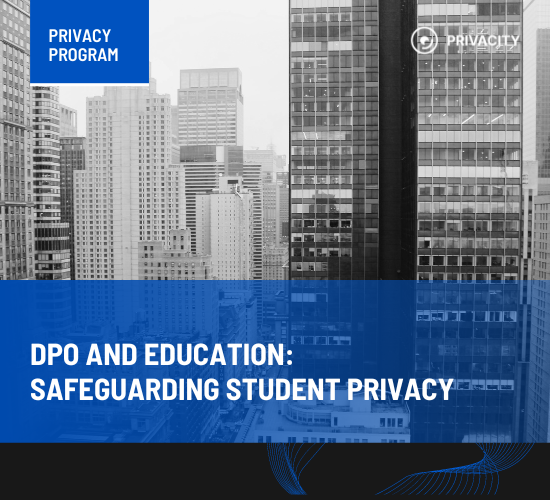DPO and Education: safeguarding student privacy
In today’s world, where technology is increasingly integrated into education, safeguarding student privacy has never been more crucial.
Schools, universities, and learning platforms handle vast amounts of data, from academic records to personal details, making them prime targets for privacy regulations such as the Family Educational Rights and Privacy Act (FERPA) and the General Data Protection Regulation (GDPR).
In this article, we will explore the role of a Data Protection Officer (DPO) in educational institutions and how they ensure compliance with these essential regulations
Who is a DPO?
Definition of DPO
While FERPA does not explicitly mention the role of a DPO, under the GDPR, the DPO is responsible for monitoring internal compliance, informing, and advising on data protection obligations. Additionally, the DPO acts as a contact point for data subjects and the relevant supervisory authority.
When do educational institutions need to appoint a DPO?
Appointing a DPO in your educational institution may be a legal requirement or a voluntary decision.
For instance, in Europe, under Article 37(1) of the GDPR, appointing a DPO is mandatory for public authorities, including public schools and universities, as well as in certain other cases. In contrast, in the U.S., FERPA does not specifically mandate the appointment of a DPO.
However, the increasing complexity of managing student data and navigating various privacy laws makes the DPO’s role increasingly necessary in the educational sphere.
Below, we will outline some key aspects of FERPA and GDPR to demonstrate why appointing a DPO is crucial for educational institutions, even if you are not legally required to have one.
The Role of a DPO in ensuring compliance with FERPA and GDPR
- Policy development and implementation
Article 24(2) of the GDPR requires educational institutions to develop and maintain a comprehensive framework of data protection policies. Similarly, FERPA provisions, such as §99.31, establish a regime of de facto comparable requirements.
This includes a wide range of documentation, including but not limited to privacy policies, data subject request procedures, data breach response plans, and more.
DPO brings the necessary expertise to develop such policies, ensuring they are both legally compliant and tailored to the institution’s needs. Additionally, the DPO possesses the skills to coordinate policy implementation across departments, monitor compliance, and suggest improvement.
- Training and auditing
To ensure understanding and adherence to data protection regulations, DPOs conduct regular training sessions for staff. These sessions cover not only FERPA and GDPR requirements but also best practices for handling student data, fostering a culture of data protection within the institution.
Additionally, DPOs perform regular audits to ensure ongoing compliance with FERPA and GDPR provisions. This process also helps identify potential risks or violations, enabling proactive problem-solving and continuous improvement in data protection practices.
- Managing data subject requests
GDPR and FERPA (in Articles 15-22 and §§99.4, 99.5 respectively) grant students, and in some cases their parents, a range of rights that they can exercise by making requests to educational institutions.
A DPO ensures that this complex process is managed efficiently and in full compliance with both laws. Their expertise helps educational institutions navigate the nuances of data subject rights, reducing the risk of non-compliance and building trust with students and parents.
- Consent management
In many cases, such as under §99.30 of FERPA, educational institutions are required to obtain proper consent from students or their parents for processing operations. In turn, in Article 6, the GDPR requires data controllers (such as schools) to rely on freely given consent in situations that exclude any other legal bases for processing data (examples of the latter include keeping records of their educational results that are covered by either contract with parents or legal guardians or legal obligation to report to the educational authorities). DPOs play a pivotal role in managing this process.
They are responsible for developing clear, comprehensive consent forms that explain how student data will be used, shared, and protected. Additionally, they implement systems that allow students to easily provide or withdraw consent for various data processing activities. For students under 18, DPOs ensure that proper mechanisms are in place to obtain and verify parental consent, adding an extra layer of protection for minors.
- Data security and breach management
GDPR requires educational institutions to build a security system of technical and organisational measures to protect student data. Although FERPA does not contain specific provisions regarding data security, the Department of Education places significant emphasis on this issue in its guidelines and recommendations.
While practical implementation of such measures often relies on the shoulders of technical specialists, DPO can help by developing a comprehensive information security policy, conducting regular security audits and risk assessments and ensuring security measures are periodically updated to address evolving threats.
In the unfortunate event of a data breach, DPOs coordinate the response, assessing the severity of the breach and determining if it meets the threshold for reporting to authorities or affected individuals. They oversee the notification process and conduct post-breach analyses to identify vulnerabilities and implement measures to prevent future incidents.

How DPOs help with specific educational privacy challenges
Digital technologies and student data
Educational institutions often rely on third-party service providers for various functions, from learning management systems to cloud storage solutions. Thus, according to Article 28(1) of the GDPR, the controller is required to conduct due diligence before engaging such providers. At the same time, while FERPA does not contain specific provisions on this matter, state laws typically mandate similar actions, for instance, in California.
DPOs are crucial in ensuring these partnerships do not compromise student privacy.
For instance, they conduct due diligence on potential vendors, assessing their data protection practices and security measures. They also monitor the ongoing compliance of third-party providers and address any issues that arise. This role is particularly important as educational technology evolves, introducing new privacy challenges with each innovation.
Research data protection
Educational institutions, particularly universities, often conduct extensive research involving personal data. DPOs play a crucial role in ensuring that research activities comply with data protection regulations. They advise on privacy considerations in research design, help develop data management plans, and ensure proper consent procedures are in place for research participants.
Campus security and surveillance
Balancing campus safety with privacy rights is a complex challenge that DPOs help navigate. They guide the appropriate use of surveillance technologies, such as CCTVs and access control systems. They also address privacy concerns related to emerging campus security technologies, such as facial recognition systems or location tracking, ensuring that any implementation of such technologies is lawful, necessary, and proportionate.
Consequences of not having a DPO
In cases where appointing a DPO is legally required, failure to do so can result in fines or other sanctions imposed by the competent authority. Under GDPR, for example, Article 83 specifies that failing to appoint a DPO can lead to administrative fines of up to €10,000,000 or, for organisations, up to 2% of the total worldwide annual turnover.
While FERPA does not mandate the appointment of a DPO, repeated FERPA violations, which could stem from the lack of a privacy professional, might result in the loss of federal funding—a primary financial source for many educational institutions, – hefty fines, cease and desist letters, etc.
These consequences go beyond legal penalties and can include reputational damage, civil lawsuits from affected individuals, and a loss of trust from students and parents.
Real-world cases
Here are some examples of cases which could be avoided by appointing a DPO:
- In 2017, the University of Oklahoma inadvertently exposed thousands of students’ educational records when they were mistakenly emailed to families, marking a significant FERPA violation.
- The Cypriot DPA imposed a fine of €45,000 on the Open University of Cyprus for failing to put in place appropriate security measures according to Article 32 of GDPR.
- The Italian DPA fined the Commercial University of Milan €200,000 for violating Articles 5(1)(a), (c), (e), 6, 9, 13, 25, 35, 44 and 46 GDPR by using non-compliant supervisory systems as part of its provision of remote exams to students during the COVID-19 pandemic.
Conclusion
To sum up, the appointment of a DPO should be seen not as a regulatory burden, but as an opportunity to enhance trust, improve data management practices, and ultimately support the core educational mission of the institution.
As the digital landscape continues to evolve, the guidance and expertise of DPOs will be crucial in navigating the complex intersection of technology, privacy, and education.
Read more about our special service — DPO as a service.

